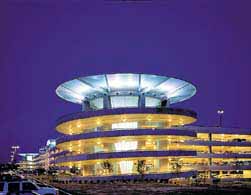Freelon Group
Captures Firm Award
 The
Freelon Group, a 32-member architectural firm with offices in Research
Triangle Park and Charlotte, is the 2001 recipient of the North
Carolina Chapter of the American Institute of Architects Firm Award.
This honor is the highest presented to an architectural business by
the state chapter. The
Freelon Group, a 32-member architectural firm with offices in Research
Triangle Park and Charlotte, is the 2001 recipient of the North
Carolina Chapter of the American Institute of Architects Firm Award.
This honor is the highest presented to an architectural business by
the state chapter.
The award is presented annually to a North Carolina firm that has
consistently produced quality architecture with a verifiable level of
client satisfaction for a period of at least 10 years as an
established presence in the state.
The prestigious award was presented at the AIA North Carolina’s
Summer Design Conference in Charlotte to Philip G. Freelon, AIA, the
firm’s founder and president; Chris E. Brasier, AIA, vice president;
Victor Vines, AIA, vice president; and Dennis E. Stallings, AIA,
principal.
The Freelon Group also received an AIA Merit Award this year for its
work on the new 842,400-square-foot parking deck at the Raleigh-Durham
International Airport (above). The parking deck also received the 2001
International Parking Association’s Presidents Award and Merit Award
for Aesthetics of Structure.
Diversity of project scale, type and scope is a trademark of the firm
founded by Freelon in 1990. Recent accomplishments include the
Maryland Museum of African American History and Culture in Baltimore;
the Lord Corporation world headquarters and training center in Cary;
and the AIA North Carolina Honor Award winning Chambers
Biomedical-Biotechnology Lab Building on the campus of N.C. Central
University in Durham.
Other projects include renovation of Ovens Auditorium in Charlotte
and, with HOK Architects, the Durham Bulls Athletic Park in Durham.
The firm is currently working on the feasibility study for a new
African-American museum in Philadelphia.
Freelon, a graduate of N.C. State University’s School of Design, was
project architect for the American Airlines Terminal at RDU while
associated with the firm of O’Brien/Atkins Associates. He earned the
master of architecture degree from MIT and received the Loeb
Fellowship from Harvard University Graduate School of Design.
“It was a logical next step for Phil to create his own firm, which
he did with the same kind of commitment to quality so evident in his
previous design work,” says Claude E. McKinney, former dean of NCSU
School of Design. “He identified and assembled the best talent to
form the Freelon Group.”
Former N.C. Central University Chancellor Julius L. Chambers says,
“That our university has repeatedly awarded contracts to the Freelon
Group is a testament to our high regard for their service to our
university and the excellence of their work. I recommend the Freelon
Group without reservations. Their excellent work has exceeded our
expectations and elevated the level of service we are accustomed to
receiving.”
Recognition comes steadily to the Freelon Group. Recent awards
include: City of Raleigh Sir Walter Raleigh Honor Award for the Lake
Johnson Boathouse, State of North Carolina Award for Service
Excellence from the State Office of Construction, American Society of
Landscape Architects North Carolina Merit Award for the Durham Master
Plan and the Lord Corporate headquarters in Cary, Triangle Commercial
Real Estate Champion Award for Best Development Team, Diamondview
office building in Durham and the PPG Awards Best of Show Grand Prize
for furniture design.
“The Freelon Group continuously strives to provide architectural
services at the highest level,” says Marvin J. Malecha, FAIA, dean
of N.C. State University’s School of Design. “Their approach to
the design of buildings matches creativity with the exigencies of the
needs of a client and the community.”
Freelon’s firm was one of several companies spotlighted in the
December 1999 issue of this magazine for their commitment to building
bridges between the business community and the public schools.
For several years the architectural firm selects one or more local
high school students as interns.
Freelon and his staff attend career days at public schools where they
talk about opportunities in architecture and encourage students to
stay in school.
“I think it’s important on a lot of levels,” Freelon said.
“The students learn a lot and get practical skills. And for
architecture, it’s crucial that we get a continuous steam of
excellent students.”
Return to Special Section
Return
to magazine index
|
|

